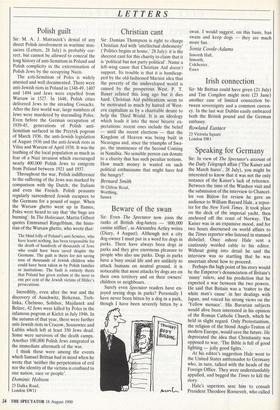LETTERS
Polish guilt
Sir: M. A. J. Matraszek's denial of any direct Polish involvement in wartime mas- sacres (Letters, 28 July) is probably cor- rect, but cannot be allowed to conceal the long history of anti-Semitism in Poland and Polish complicity in the extermination of Polish Jews by the occupying Nazis.
The anti-Semitism of Poles is widely attested and well documented. There were anti-Jewish riots in Poland in 1348-49, 1407 and 1494 and Jews were expelled from Warsaw in 1527. In 1648, Polish cities delivered Jews to the invading Cossacks. After the first world war, large numbers of Jews were murdered by marauding Poles. Even before the German occupation of 1939-45, generations of Polish anti- Semitism surfaced in the Przytyk pogrom of March 1936, the anti-Jewish legislation of August 1936 and the anti-Jewish riots in Vilna and Warsaw of April 1938. It was the loathing of the local population as much as fear of a Nazi invasion which encouraged nearly 400,000 Polish Jews to emigrate from Poland between 1921 and 1937.
Throughout the war, Polish indifference to the suffering of the Jews was marked by comparison with the Dutch, the Italians and even the French. Polish peasants regularly surrendered Jewish escapees to the Germans for a pound of sugar. When the Warsaw ghetto went up in flames, Poles were heard to say that 'the bugs are burning'. In The Holocaust, Martin Gilbert quotes Emmanuel Ringelblum, the histo- rian of the Warsaw ghetto, who wrote that:
The blind folly of Poland's anti-Semites, who have learnt nothing, has been responsible for the death of hundreds of thousands of Jews who could have been saved despite the Germans. The guilt is theirs for not saving tens of thousands of Jewish children who could have been taken in by Polish families or institutions. The fault is entirely theirs that Poland has given asylum at the most to one per cent of the Jewish victims of Hitler's persecutions.
Incredibly, even after the war and the discovery of Auschwitz, Birkenau, Treb- linka, Chelmno, Sobibor, Majdanek and Belzec, 42 Jews were killed by Poles in the infamous pogrom at Kielce in July 1946. In the autumn of that year, there were further anti-Jewish riots in Cracow, Sosnowiec and Lublin which left at least 350 Jews dead. Some were survivors of the death camps. Another 100,000 Polish Jews emigrated in the immediate aftermath of the war.
I think these were among the events which Samuel Brittan had in mind when he wrote that 'neither the perpetration of evil nor the identity of the victims is confined to one nation, race or people'.
Dominic Hobson
23 Dulka Road, London SW11


























































 Previous page
Previous page